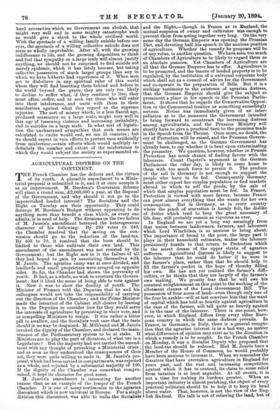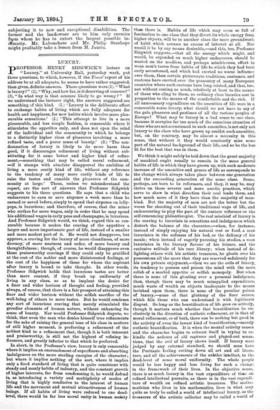AGRICULTURAL DISTRESS ON THE CONTINENT. T HE French Chamber has the
defects and the virtues of its youth. A plausible amendment to a Minis- terial proposal is submitted to it, and it at once accepts it as an improvement. M. Burdeau's Conversion Scheme will place 'a round sum, 42,000,000 a year, at the disposal of the GOvernment, and why should it not go to the impoverished landed interest? The Socialists and the Right on Tuesday saw their opportunity. They could derange M. Burdeau's Budget without appearing to do anything more than benefit a class which, as every one admits, is in need of help. The divisions on the two halves of M. Jaiires's amendment betrayed the heterogeneous character of his following. By 280 votes to 240, the Chamber resolved that the saving on the con- version should go to the reduction of the land-tax. By 408 to 70, it resolved that the boon should be limited' to those who cultivate their own land. This amendment of the amendment was not resisted by the Government; but the Right saw in it the failure of all they had hoped to gain by associating themselves with M. Jaures. The agrarian camp was at once divided, and landlords' and small proprietors were arrayed on opposite sides. SO far, the Chamber had shown the perversity of youth. It had, as a whole, no wish to overturn the Govern- ment; but it liked the sense of being able to vote against it Now It was to show the docility of youth. The Minister of Finance told the Deputies that he and his colleagues would not take the responsibility of carrying Out the direction of the Chamber; and the Prime Minister Made the intention of the Cabinet still clearer by leaving it to the Deputies to consider how far they would serve the interests of agriculture by persisting in their vote, and. so compelling Ministers to resign. It was rather a bitter pill to swallow, and the Socialists took care that the taste should in no way be disguised. M. Millerand and M. Jaures invoked the dignity of the Chamber, and declared the main- tenance of the Parliamentary system to be at stake. If Ministers are to play the part of dictators, of what use is a Legislature? But the majority had not carried the amend- ment with any thought of provoking a Ministerial crisis ; and as soon as they understood the consequences of their act, they were quite willing to undo it. M. Jaures's pro- posal, which had been carried in compartments, was rejected as a whole, and rejected. by a substantial majority of 100. If the dignity of the Chamber was somewhat compro- mised, it kept its character for good sense. M. jaures's amendment is interesting for another reason than as an example of the temper of the French Chamber. It is one of many testimonies to the agrarian discontent which is now universal in Europe. For a single division this discontent was able to unite the Socialists and the Right, —though in France as in England, the mutual suspicion of owner and cultivator was enough to prevent them from acting together very long. On the very same day the German Emperor was opening the Prussian Diet, and devoting half his speech to the anxious position of agriculture. Whether the remedy he proposes will be of any value, is another question. We have seen too much of Chambers of Agriculture to be likely to regard them as an absolute panacea. Yet Chambers of Agriculture are all that the German Emperor has to offer. Agriculture is to be promoted, and the tenure of landed property is to be regulated, by the institution of a universal corporate body which shall act as a council of advice for the Government and co-operate in the preparation of Bills. But it is a striking testimony to the existence of agrarian distress, that the German Emperor should give the subject so prominent a place in his speech to the Prussian Parlia- ment. It shows that he regards the Conservative Opposi- tion to the Commercial treaties as something exceedingly serious. Notice was immediately given of an inter- pellation as to the measures the Government intended to bring forward to counteract the increasing distress among agriculturists, and the Prussian Ministry will shortly have to give a practical turn to the promises made in the Speech from the Throne. Once more, no doubt, the cry of Protection will be raised, and the Prussian Govern- ment be challenged, as the German Government has already been, to say whether it is bent upon exterminating the peasantry. We question, however, whether in Prussia Protection has much chance of finding favour with the labourers. Count Caprivi's argument in the German Parliament the other day, is likely to come home to them with too much force to permit it. The produce of the soil in Germany is not enough to support the people who have to be fed. Consequently Germany must either export her surplus population or find markets abroad in which to sell the goods, by the sale of which that surplus population must be fed. In France, Protection is viewed with more favour, because France can grow almost everything that she wants for her own consumption. But in Germany, as in every country where the pinch of starvation is keenly felt, the dislike of duties which tend to keep the great necessary of life dear, will probably remain as vigorous as ever. In England. we are yet a long way seemingly from that union between landowners, farmers, and labourers which Lord Winchilsea is so anxious to bring about. The importance of bread to the poor, the large part it plays in their household estimates, makes the labourer persistently hostile to that return to Protection which is the secret dream of the upper strata of agrarian sufferers. Agricultural distress is likely to suggest to the labourer that he could do better if he were in the farmer's place, rather than that he should. help to fill the farmer's pocket in the hope of thereby filling his own. He has not yet realised the farmer's diffi- culties, or he thinks that they are largely of the farmer's own making. We greatly fear that he will owe his eventual enlightenment on this point to the working of the allotment clauses of the Local Government Bill. The possession of four acres of land—even though only one of the four be arable—will at last convince him that the want of capital which has told so heavily against agriculture in the case of the farmer, will tell quite as heavily against it in the case of the labourer. There is one point, how- ever, in which England differs from every other Euro- pean country in which the same distress prevails. In France, in Germany, in Italy, there is a general recogni- tion that the agrarian interest is in a bad way, no matter what differences of opinion may exist as to the direction in which a remedy is to be sought. In the French Chamber on Monday, it was a Socialist Deputy who proposed that the land-tax should be reduced. Had M. Jaures been a Member of the House of Commons, he would probably have been anxious to increase it. When we remember the disasters that have overtaken agriculture in England for years past, and the vast and increasing competition against which it has to contend, its claim to some relief from taxation is at least arguable. At all events, it is not a time for making its burdens greater. When an important industry is almost perishing, the object of every practical politician should be to help it to keep its head above water. That, however, is not the view of the Eng- lish Radical. His talk is not of relieving the land, but of
subjecting it to new and exceptional disabilities. The fanner and the landowner are to him only enemies fvpm whom he has to extort the largest possible in- d€mnity. Mr. Labouchere and Mr. Philip Stanhope might profitably take a lesson from M. Jaures.



































 Previous page
Previous page